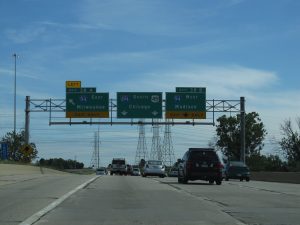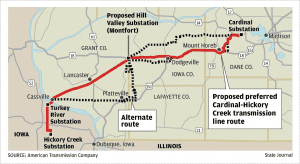Archive for 2019
Wisconsin’s 2019 Air Quality Success Faces Challenges
Most Wisconsin residents can breathe easy: fully 95 percent of the population lives in areas meeting federal air quality standards. That is the good news within the Wisconsin Department of Natural Resources 2019 Air Quality Trends Report that found continuing improvement as concentrations of several pollutants decreased throughout the state. But recent federal activities threaten to erase the significant achievements highlighted in the report.
Read More >Glen Moberg sings “Aldo Leopold’s Shack”
Our friend Glen Moberg, reporter from Wisconsin Public Radio, shared this video of his song “Aldo Leopold’s Shack.” Sadly, Glen passed away this fall. Many will remember Glen’s excellent stories and devotion to central Wisconsin.
Read More >Working Together, Working Better: 2019 Wisconsin’s Green Fire Annual Meeting
Wisconsin’s Green Fire wants you to be part of the discussion at our third Annual Membership Meeting, Oct. 4-5 at Treehaven. Everyone can be actively involved in the weekend. Please join us. We value your input. Members are the soul of our organization.
Read More >Nitrogen in Wisconsin Waters and Health Effects of Nitrate in Drinking Water – WGF Videos
Nitrogen in Wisconsin Waters and Health Effects of Nitrate in Drinking Water – WGF members presenting on nitrogen in Wisconsin waters and the health effects of nitrate in drinking water.
Read More >Nitrates in Wisconsin Waters – A Wisconsin’s Green Fire Policy Analysis
While Wisconsin has among the finest freshwater resources in North America, an increasingly large number of Wisconsin communities, homes, schools, and businesses find their water sources unsafe to drink. The water crisis in Flint, Michigan was a wake-up call about the hazards of water supplies we once assumed would always be safe. The total scope of the water quality crisis in Wisconsin today is much larger however than one community or one region. Wisconsin needs a drinking water solution equal to the magnitude of the problem. This paper lays out elements of that solution.
Read More >Cropland Management and Water Quality – Phosphorus, Pathogens and Manure Management, Antibiotics and Manure Management
WGF releases a series of videos of members presenting on the relationship between cropping practices and water quality in Wisconsin, based on current science. This information draws from the expertise of water quality and public health scientists from DNR and the university system as well as agricultural conservation experience from WI Dept of Agriculture and …
Read More >WGF Comment to WI Public Service Commission on Cardinal Hickory Creek Transmission Project
WGF members have evaluated the application for the proposed CHC high voltage transmission line (hvtl) by the Public Service Commission (PSC) of Wisconsin. WGF requests that the PSC refer to the previously submitted WGF comments regarding the proposed CHC for the draft Environmental Impact Statement for more information, PSC reference number 364009 in Docket 5-CE-146.
We …
Read More >Comment letter for WDNR Draft Inland Trout Management Plan 2020-2029
The issues we have addressed here are significant enough to warrant revision and some restructuring of this plan. Despite these issues, we think the trout plan represents a major step forward for the WDNR trout program and for the management of the inland trout resource in the state. We thank you for the opportunity to comment, and we are happy to discuss our comments with you in detail. We’ve also attached a list of editorial comments and suggestions to improve the content and clarity of the plan.
Read More >WGF Comments SB 252 Flood Risk Reduction Pilot
As a member of Wisconsin’s Green Fire (WGF) and a resident of Ashland County, I write to express my appreciation to the sponsors of Senate Bill 252 for this investment in green infrastructure approaches to flood reduction. Prior to my retirement from the Department of Natural Resources, I worked on several initiatives to reduce runoff in the Lake Superior basin. The demonstration projects that would be funded pursuant to SB 252 would build on a long history of partnerships among local residents, watershed organizations, and government at the local, tribal, state, and federal levels. This investment by state government would be timely and much appreciated.
Read More >Comments to the U.S Fish and Wildlife Service on Proposal to Remove the Gray Wolf from the Endangered Species List
Wisconsin’s Green Fire Comments to the U.S Fish and Wildlife Service on Proposal to Remove the Gray Wolf (Canis lupus) from the List of Endangered and Threatened Wildlife, Federal Register 84 (51):9648-9687 (Docket No. FWS-HQ-ES-2018-0097)
Introduction
Thank you for the opportunity to offer comments on the draft gray wolf delisting rule. Wisconsin’sGreen Fire is a nonpartisan and …








